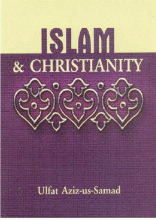Islam & Christianty

The Economics of Islam
In the economic field, Islam considers all unearned income to be unjust and unlawful. It upholds the dignity of labor. The Prophet said:
"No one eats better food than that which he eats out of the work of his own hands. "
(Bukhari, 35: 15)
In the social order of Islam the possibility of exploitation of man by man is minimized, without the total abolition of private property or enterprise, by the prohibition of monopoly, blackmarketing, hoarding and interest (riba), that is, a fixed extra return for money lent for any purpose. Says the Quran:
(Those who live on interest cannot rise up save as he ariseth whom the Devil hath prostrated by his touch. That is because they say: Trade is just like interest; whereas God permitteth trading and forbiddeth interest.) (2:275)
In order to reduce inequality and make sure that everyone gets the basic necessities and has equal opportunities in life, Islam imposes a tax on the capital of the rich for the benefit of the poor. This tax, called Zakah, is different from and in addition to Khairat or voluntary charity. Moreover, the Qur'an contains frequent and repeated exhortations to the people to spend their wealth for the welfare of others. It says that the profession of Faith and the religious devotions of a man who is not actively engaged in works of mercy are vain and not acceptable before God. And, finally, by its judicious laws of inheritance, Islam makes the concentration of wealth in few hands impossible.
While not ignoring the importance of economic activities in human life, Islam strongly condemns the tendency to judge people by their financial and social status. The mark of a man's worth is not his wealth but higher morals and greater participation in the works of mercy. Wealth is not an end, but "a means of support" to the people. The wealth that a man earns is not absolutely his. It is a trust with him from God. He has acquired it by employing the God-given faculties and by the aid and the facilities provided by the society. He must repay his debt to the society and spend as much as possible, out of what he has earned, in the Way of God. Above all, in the pursuit of wealth a man must not lose sight of the higher values of life.
